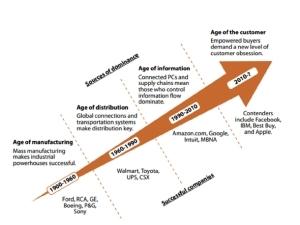
Do you get a sense that consumers are more demanding? You provide them with good products at a good price, and they still want something better. Most often, the demand is not just about being better and cheaper, but about uniqueness. And while you strive to give them what they want, if you mess up just once, they might tell everyone around the globe using Twitter and Facebook.
This change in customer expectations was foreseen back in 1999 by B Joseph Pine II and James H Gilmore, in their book, The Experience Economy. They described a new economy in which experience is the new currency, and argue that businesses must orchestrate memorable events or "experiences" for their customers. That memory becomes the product. If a business provides a better experience, it can begin charging for the value of the transformation that experience creates. This, the authors argue, is a natural progression from the previous agrarian, manufacturing and service economies.
Thirteen years later, a lot of their ideas have come to fruition. Even with the rise of energy and commodity costs, the cost for producing most products has decreased significantly. As a result, a product with a standard set of features and design is considered a commodity by consumers. In addition to the fact that these products are produced and made available in mass quantities, what consumers really desire is the experience they gain from consuming the product or service. This experience is not only that of using a product such as a smartphone or an automobile, but also the incidental experience of purchasing the product or getting assistance.
Share